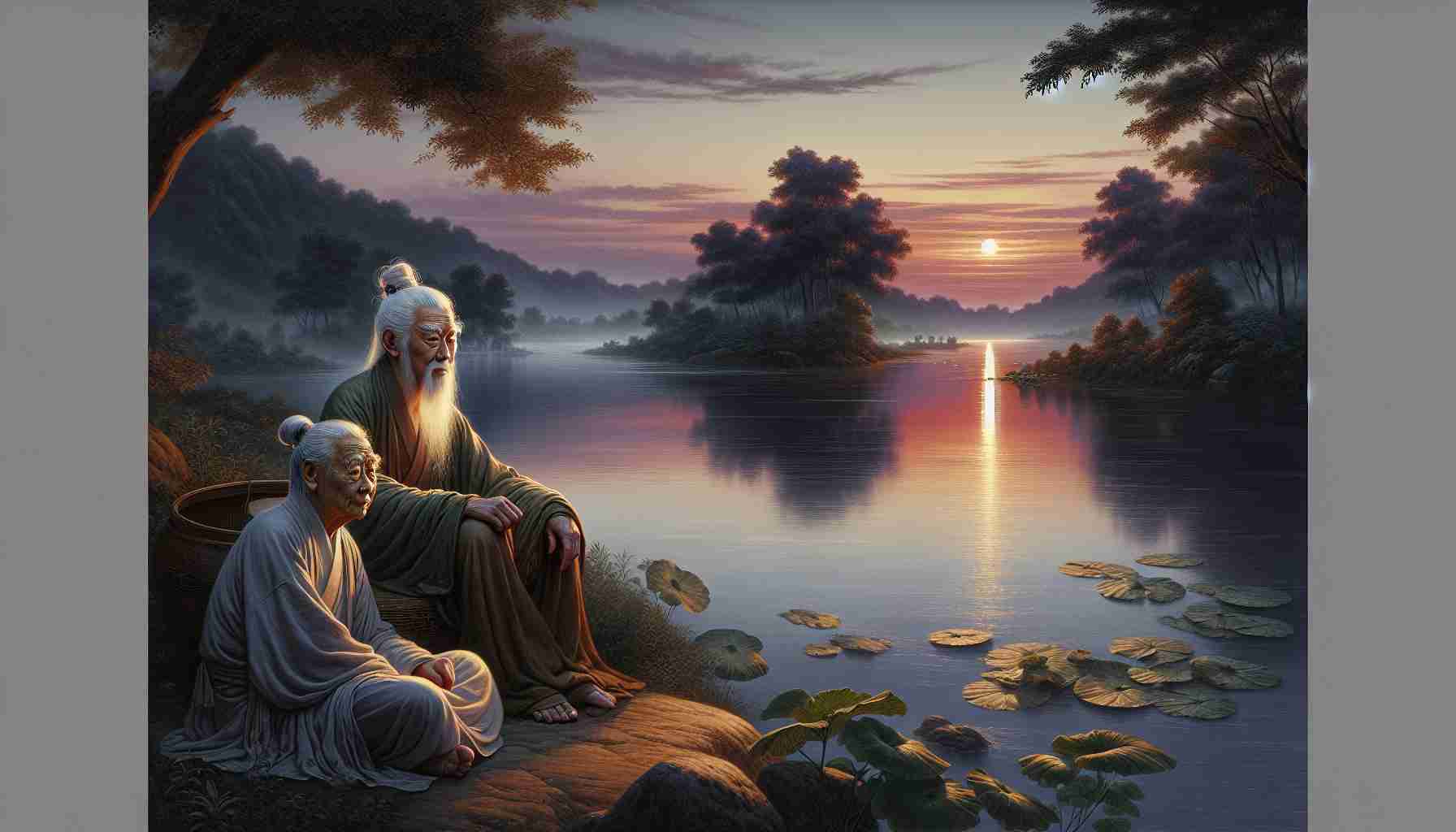

The village market buzzed with chatter and clinking dishes as smoke from cooking fires drifted into the sky. I, Ping, stood behind my family’s stall, stacking bundles of herbs. My arms were sore, and my mind was full of noise. “Faster, Ping!” my uncle shouted for the third time that morning. “Work brings food. Do more!”
I sighed. "But Uncle," I said under my breath, "what if doing more just makes everything harder?"
That evening, as the sun began to set, I wandered away from the village, my basket empty but my heart heavy. I didn't know where I was going; I just walked until the trees got taller and the sounds faded. That’s when I saw him—an old man with long white eyebrows sitting by the river, staring at the water like it was telling a story.
He looked peaceful, not at all like the rushed people in the market. He wore soft clothes that looked light as wind. Quietly, I sat a little ways off, hoping not to bother him.
After a long time, he spoke. “The river flows without pushing. It moves around rocks, not through them.”
I blinked. “What do you mean, sir?”
He turned his head slowly to look at me. “Most people think life is about effort, about forcing their way forward. But the Tao—what we call the Way—teaches us something different. It teaches us how to move like water.”
I didn’t understand. “But how do you get anything done if you don’t try hard?”
He smiled softly. “There is a kind of action that flows from stillness. We call it Wu Wei—non-action that isn’t doing nothing. It’s doing what is needed, when it is needed, in the way that fits the moment.”
His words sank into me like the river’s reflection. I thought about how I always rushed, always worried, always tired.
“Come here tomorrow,” he said, his eyes twinkling. “Watch the river with me.”
So I did. For the next few days, I sat with the wise old man—his name was Laozi, a great teacher known in many lands. He never gave me instructions. He never told me what to do. But every day, we watched the river roll past, and I began to see.
Leaves floated on the water without sinking. Small fish darted and turned, never bumping into rocks. Everything moved, yet nothing seemed rushed.
Soon, my mind grew quiet. My arms no longer felt heavy. Back at the market, I began to do things with less struggle. I listened more. Moved smarter. Smiled more.
“What happened to you?” my uncle asked one day.
“Nothing,” I said, laughing. “And everything.”
I didn’t change overnight. But now, when life feels too heavy, I go back to the river in my mind. I remember Laozi, and the way he sat still but felt full of movement.
Through Wu Wei, I learned that sometimes, doing less lets life unfold the way it’s meant to—and that may be the greatest power of all.
The village market buzzed with chatter and clinking dishes as smoke from cooking fires drifted into the sky. I, Ping, stood behind my family’s stall, stacking bundles of herbs. My arms were sore, and my mind was full of noise. “Faster, Ping!” my uncle shouted for the third time that morning. “Work brings food. Do more!”
I sighed. "But Uncle," I said under my breath, "what if doing more just makes everything harder?"
That evening, as the sun began to set, I wandered away from the village, my basket empty but my heart heavy. I didn't know where I was going; I just walked until the trees got taller and the sounds faded. That’s when I saw him—an old man with long white eyebrows sitting by the river, staring at the water like it was telling a story.
He looked peaceful, not at all like the rushed people in the market. He wore soft clothes that looked light as wind. Quietly, I sat a little ways off, hoping not to bother him.
After a long time, he spoke. “The river flows without pushing. It moves around rocks, not through them.”
I blinked. “What do you mean, sir?”
He turned his head slowly to look at me. “Most people think life is about effort, about forcing their way forward. But the Tao—what we call the Way—teaches us something different. It teaches us how to move like water.”
I didn’t understand. “But how do you get anything done if you don’t try hard?”
He smiled softly. “There is a kind of action that flows from stillness. We call it Wu Wei—non-action that isn’t doing nothing. It’s doing what is needed, when it is needed, in the way that fits the moment.”
His words sank into me like the river’s reflection. I thought about how I always rushed, always worried, always tired.
“Come here tomorrow,” he said, his eyes twinkling. “Watch the river with me.”
So I did. For the next few days, I sat with the wise old man—his name was Laozi, a great teacher known in many lands. He never gave me instructions. He never told me what to do. But every day, we watched the river roll past, and I began to see.
Leaves floated on the water without sinking. Small fish darted and turned, never bumping into rocks. Everything moved, yet nothing seemed rushed.
Soon, my mind grew quiet. My arms no longer felt heavy. Back at the market, I began to do things with less struggle. I listened more. Moved smarter. Smiled more.
“What happened to you?” my uncle asked one day.
“Nothing,” I said, laughing. “And everything.”
I didn’t change overnight. But now, when life feels too heavy, I go back to the river in my mind. I remember Laozi, and the way he sat still but felt full of movement.
Through Wu Wei, I learned that sometimes, doing less lets life unfold the way it’s meant to—and that may be the greatest power of all.